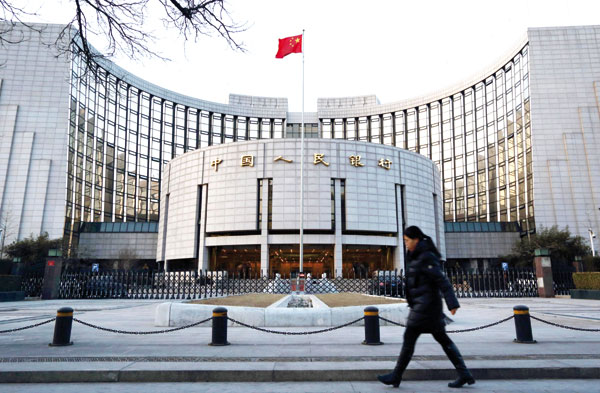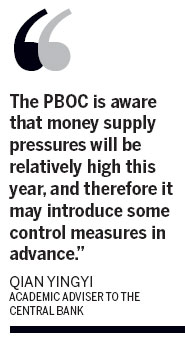Interest rate hikes 'cannot be ruled out'

|
 |
|
The headquarters of the People's Bank of China in Beijing. On Tuesday, Premier Wen Jiabao announced the government had set an annual inflation target of 3.5 percent. [Photo/China Daily] |
Diverse measures could be used to help control inflation, says adviser
The possibility of further interest rate hikes cannot be ruled out this year, if the government is to meet its inflation and money supply targets, an academic adviser to the central bank said on Wednesday.
Qian Yingyi, a professor at Tsinghua University who advises the People's Bank of China, said the economic growth conditions this year will be better than 2012, but that inflation could become an issue due to easing monetary policies worldwide.

"In addition, local governments will be looking to increase their investment spending, with the arrival of the new leadership.
"The PBOC is aware that money supply pressures will be relatively high this year, and therefore it may introduce some control measures in advance," Qian said.
On Tuesday, Premier Wen Jiabao announced the government had set an annual inflation target of 3.5 percent, as measured by the consumer price index, 0.5 percentage points lower than in 2012, and a 13 percent increase in M2, the broader measure of money supply that covers deposits and cash in circulation.
In 2012, CPI rose 2.6 percent, while M2 grew by 13.8 percent, lower than the official target of 14 percent.
Attending a group discussion at the Chinese People's Political Consultative Conference, Qian said it would be difficult for the government to meet both targets set this year.
He added that in recent months concerns over rising prices had prompted the PBOC to use short-term liquidity measures such as reverse repos, instead of the traditional adjustments in interest rates and the reserve requirement ratio.
"When the situation calls for more flexible policy making, short-term operations are much more agile and easier to maneuver."
He noted that short-term speculative capital inflows, or "hot money", had led to an appreciation of the yuan over the past two quarters, adding he expected continued uncertainly over the exchange rate this year.
He added the PBOC is also likely to further broaden the permitted fluctuation range of yuan trading in 2013, but declined to clarify by how much the range should be adjusted.
"The range will be gradually broadened in accordance with market conditions, and there won't be any permanent restraints," he said.
The PBOC announced in April that the yuan would be allowed to fluctuate by 1 percent from a daily midpoint - double the previous 0.5 percent.
Qian said limits on interest rates offered by commercial banks may also be further loosened, as the authorities continue market-oriented reforms of the financial system.
"The first step would probably be cutting the lower limits," he said.
In 2004, the PBOC removed its lower limit on bank deposit rates and permitted lending rates among lenders to be 10 percent lower than the benchmark rates.
In June 2012, it allowed bank deposit rates to be 10 percent higher than the benchmark rates, while cutting the lower limit of lending rates to 80 percent of the benchmark. In July, it further reduced the limit on lending rates to 70 percent.
Analysts have suggested the limits have been blamed for financial difficulty among enterprises, and have generated a rapid growth in shadow banking activities in recent years.
Shadow banking, as the name suggests, mainly refers to credit access outside the regular financial system.
An investigation into the shadow banking sector by the central bank and banking regulator concluded the problem was not as severe as some had estimated, Qian said.
wangxiaotian@chinadaily.com.cn























